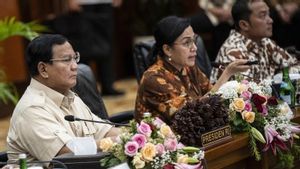JAKARTA - A small group of very wealthy individuals could help tackle world hunger with just a fraction of their net worth, said the Director of the United Nations' World Food Program (WFP).
"Billionaires need to step up now, just one more time," David Beasley said in an interview on CNN Connect the World, citing specifically the two richest people in the world, Jeff Bezos and Elon Musk.
"6 billion United States (Rp. 85,082,400,000,000) to help 42 million people who will literally die if we don't reach them. It's not complicated," he added.
Tesla CEO Elon Musk has an estimated net worth of nearly $289 billion, according to Bloomberg, meaning Beasley is asking for a donation of just 2 percent of Musk's fortune.
Meanwhile, the billionaire's net worth has almost doubled since the pandemic began, hitting $5.04 trillion in October, according to progressive groups the Institute for Policy Studies and the American for Tax Fairness.
"The perfect storm of some crises, such as climate change and the COVID-19 pandemic, means many countries are "knocking on hunger," Beasley said.
It is known that half of Afghanistan's population, 22.8 million people, is facing an acute hunger crisis, according to a WFP report released Monday. Rampant unemployment and a liquidity crisis have the country teetering on the brink of a humanitarian crisis, with 3.2 million children under the age of five at risk, the report concluded.
A series of new reports from the Joe Biden Administration issued a stark warning last week that the effects of climate change would be widespread and would cause problems for every government.
Among reports, the administration details how climate change is driving migration, the first time the US Government has officially recognized the link between climate change and migration. WFP has warned of waves of this movement in the past, particularly in the 'Dry Corridor' region of Central America.
"For example, take the United States and territories in Central America, the Dry Corridor, Guatemala, Honduras, El Salvador and Nicaragua, in those areas only," Beasley explained Tuesday.
"We fed a lot of people there and the climate changed with storms and flash floods. It was devastating."
As for Ethiopia, WFP estimates 5.2 million people are in dire need of food aid in the Tigray region, where Prime Minister Abiy Ahmed has led a massive offensive against the Tigray People's Liberation Front (TPLF) since last year. Thousands of civilians have since been killed, while more than 2 million have been displaced.
Humanitarian organizations such as WFP have struggled to get supplies to those in need in the region, exacerbating the crisis.
"I don't know where they got the food from. We ran out of fuel. We ran out of cash, in terms of paying our people and we ran out of money and we couldn't get our trucks in," he concluded.
The English, Chinese, Japanese, Arabic, and French versions are automatically generated by the AI. So there may still be inaccuracies in translating, please always see Indonesian as our main language. (system supported by DigitalSiber.id)













